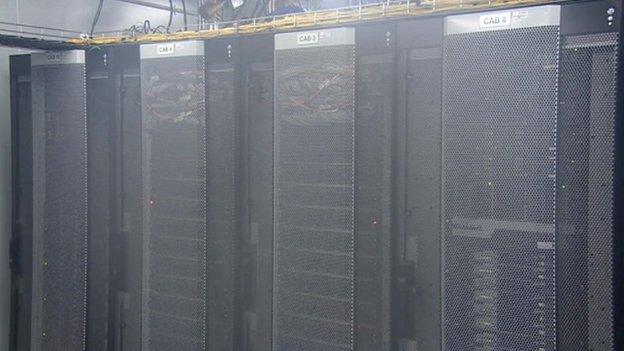Welsh supercomputer to help boost businesses
- Published
Six Welsh universities run a network of supercomputers
Businesses are being urged to take advantage of a Welsh supercomputer network that could help create jobs and boost economic growth.
Six universities in Wales are working with the private sector on the venture which has additional funding from the Welsh and UK governments and the EU.
Supercomputers are regularly used by larger businesses and retailers.
They store and analyse information and make complex calculations at speeds much faster than standard computers.
The Welsh network - which has sites in Bangor, Cardiff and Swansea - can run 320 trillion operations every second which can help small and medium-sized businesses improve productivity and innovation.
Calon Cardio Technology in Swansea is developing a pump implant to treat people with heart failure.
The company said its product is smaller, more effective and cheaper than the US manufactured models currently on the market.
The company's chief technology officer, Graham Foster, said being able to use the supercomputer has meant they are able to improve the design of the device.
He said: "If we were just using, say, a laptop computer it would take us maybe a few weeks to get some design information whereas using a supercomputer will allow us to get results in only a few days,"
The supercomputer network, HPC Wales, is run by six universities: Aberystwyth, Bangor, Cardiff, Swansea, the University of South Wales and the University of Wales, Trinity Saint David.
Private sector partners include Fujitsu and Microsoft.
It is the only one of its kind in the UK.
Access to the network was free for Calon Cardio Technology because European funding was used to cover the costs.
"A typical workstation that you might get in an office is equivalent to a Ford Fiesta whereas a cluster like HPC Wales have is a Formula 1 car and it really does allow us to get info much more quickly," Mr Foster added.
Extra productivity
The network is not free to all users.
Professor Sian Hope, chief executive of HPC Wales and executive director for innovation at Bangor University, believes businesses can benefit from extra productivity, more work and more income by using the network.
"Let's take an example of a company here in Swansea which is in the creative industries," Professor Hope told BBC Wales.

The Welsh network can run 320 trillion operations every second
"They produce visual software solutions for builders, architects, and they have a need for high performance computing.
"They didn't realise they had a need for it but they used to take five days to process a job and now it will take one day. So it gives them a competitive advantage."
There have been concerns that, when it comes to research and development, universities and businesses pursue their own interests without combining their expertise to maximise the gains for the wider economy.
The EU's latest research and innovation programme, Horizon 2020, is launched this year which is trying to address that.
Almost €80bn (£65bn) of funding is available between 2014 and 2020, which is aimed at bringing together the public and private sectors to create jobs and growth.
Professor Hope, who worked for the Ministry of Defence and British Aerospace prior to academia, said HPC Wales was a good model.
She added: "It's a perfect example of how those two worlds can be joined, of research and business coming together. But it's also about providing high level skills in order to take advantage of those new technologies."
Economy Minister Edwina Hart said: "Collaboration between industry and academia is essential if we are to commercialise research and development and speed up the development of new innovative products and processes for the benefit of the wider economy."
- Published9 January 2014
- Published13 December 2013
- Published18 November 2013
- Published12 July 2010